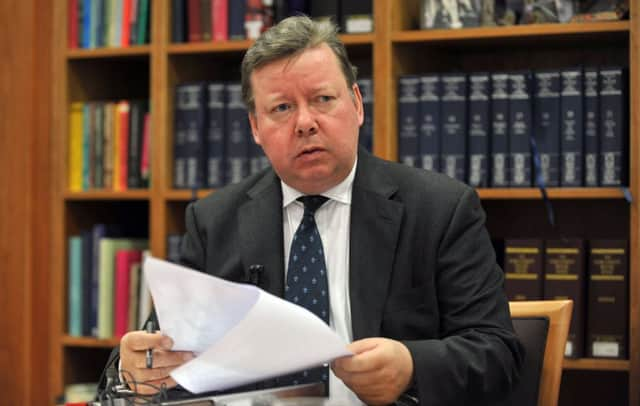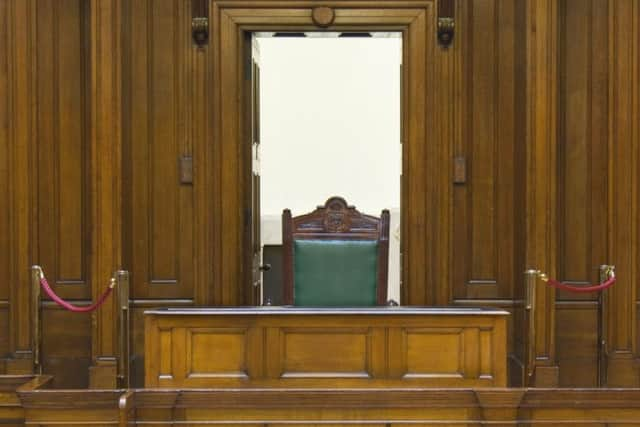Lord President aims to move Scots courts into the future


They are steeped in centuries of tradition and practice but Scottish court rooms now face a technological overhaul to pull them into the 21st century.
Lord Carloway, Lord President of the Court of Session, has set out his case as to how the court system can better reflect modern life - while streamlining the way that justice is served.
Advertisement
Hide AdAdvertisement
Hide AdThe most senior judge in Scotland suggested that defendants should be able to lodge a guilty plea at any time online - and that the need for witnesses to attend court could be greatly reduced by the use of pre-recorded video testimony.


In a recent address to the Law Society of Scotland, he said: “We now need to capture the benefits which 200 years of technological advances have given us. We certainly have not done so yet.”
He said modes of “truth finding” inherited form the “God-fearing” Victorian era were less relevant than today - and that use of video testimony could provide a more contemporaneous record of events compared to a witness appearing in court months or even years after an event.
READ MORE: http://www.scotsman.com/news/unveiling-35-finalists-for-the-scots-legal-awards-1-3990548| Unveiling 35 finalists for the Scots Legal Awards}
“In our age of technology, we must seize the moment and hold that, in the future, evidence might be presented to the court in a quite different, more advanced manner, than the appearance of the witness at court,” he said.


He said that “suitable oversight” of the procedure would be required but indicated cross-examination of the witness in civil procedure may no longer be necessary - and carried out only if a judge required it.
His comments come after two critical reports into efficiency within the court system.
Audit Scotland found that £10 million was spent on unnecessarily repeating court appearances last year with 48 per cent of summary court cases not proceeding as planned.
Advertisement
Hide AdAdvertisement
Hide AdThe Lord Gill review of 2009 found “scandalous delays” within the civil system that was failing to deliver justice “expeditiously, economically or efficiently”.
In response, The Scottish Court and Tribunal Service is set to trial this summer a new system that will ultimately allow digital processing of civil cases in the Court of Session and sheriff courts.
Lord Carloway said it was anticipated the system will be expanded to allow for the taking and hearing of evidence by recorded video.
He also said that criminal cases could benefit from prerecorded testimony, adding that criminal procedure today was a risk from being “left behind” by changes in society.
Lord Carloway called for a Digital Evidence Vault to help manage criminal cases and that the number of personal appearances of an accused and their representatives had to be reduced to “a minimum”.
Earlier, research found that witnesses failed to attend summary trials in 36 per cent of cases.
Lord Carloway also called for trials to be set only when all parties were ready.
The Scottish Courts and Tribunal Service is due to publish a report on improvements to criminal procedure and earlier backed the use of audio and video statements from witnesses.
Advertisement
Hide AdAdvertisement
Hide AdThomas Ross, president of the Scottish Criminal Bar Association, said he backed greater use of technology within the justice system - but that millions of pounds would have to be spent to create systems that will fit for purpose.
He said; “There have been cases where witnesses are abroad and they give evidence which is piped into the court room. There are the facilities to do it but they are going to have to spend millions. The court room technology we have is hopeless.
“Last week, we had a young witness give evidence via CCTV from another room in the court. We couldn’t get the link going for 45 minutes.
“The Scottish Government would have to spend tens of millions of pounds on technology. If they don’t, all this is just talk.
“At the moment, we have people in custody for trials that are scheduled for August. I thought if anything, the should be spending money on getting court rooms open.”
He said he would welcome greater use of technology in collecting witness evidence but said there could be drawbacks.
Mr Ross added: “Quite often the first statement is taken in the same way as in 1850, with the police officers sitting with various bits of paper and a series of questions. That is just madness.”